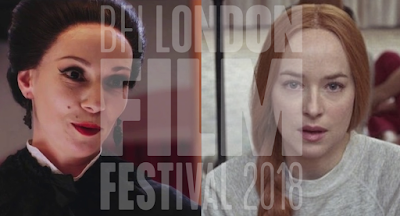The Favourite
dir. Yorgos Lanthimos, Ireland / UK / USA, 2018
Yorgos Lanthimos is back back back, and he's brought the triple threat of Olivia Colman, Rachel Weisz and Emma Stone with him for this sumptuous and irreverent telling of the true rivalry between Sarah, Duchess of Marlborough (Weisz) and Abigail Hill (Stone) for the affections of Queen Anne (Colman). The often-troublingly idiosyncratic director clearly enjoys throwing together a relatively straightforward comedy for a change (albeit in full Restoration costume), but anyone hoping for the pitch black absurdism of Lanthimos at his Lanthimost might leave disappointed.There is much to love here: Colman's dotty, temperamental and ailing monarch, Weisz's ruthless confidante and lover, and Stone's Machiavellian usurper are all more than we deserve, and all three leads make the most of the offbeat humour in Deborah Davis and Tony McNamara's script (Emma Stone in particular has a great line in falling over that endears her even more than ever). Working from someone else's screenplay for the first time since his debut, Lanthimos turns out an uncharacteristically warm film full of human beings with relatable emotions - love, fear, jealousy, ambition - which is slightly at odds with his Kubrickian shooting style (fish-eye lenses and long, deliberate tracking shots are still the order of the day). And there are some proper belters waiting to leap off the page: I don't know if this is the first use of the word "cuntstruck", but it's certainly the best so far.
If the chilling lack of humanity Lanthimos usually favours has turned you off him in the past, then this may be the film that finally lets you just enjoy yourself without that gnawing sensation of futility and discomfort that The Lobster and The Killing Of A Sacred Deer had in spades. Personally though, I miss not feeling like I've spent a hundred minutes trapped in a room with a psychopath. If anyone else had made The Favourite I feel like I'd be celebrating it a little more; as it is, I'm just hoping that Lanthimos' impressive work rate means we'll be seeing something original and faintly bonkers from him again very soon.
Stan & Ollie
dir. Jon S Baird, UK, 2018
The TV series Feud, about Bette Davis and Joan Crawford's epically antagonistic relationship, set a high standard for dramatisations of the truth behind Hollywood's thin veneer of glamour. It showed what you can do with a terrific double act, a pair of talented actors and a small amount of dramatic licence, although it did absolutely no harm that there was plenty of juicy drama to work with in the first place. Stan & Ollie, another biopic about an iconic couple from cinema's heady heyday, also has a terrific double act, a pair of talented actors and a small amount of dramatic licence, but crucially it has a total absence of juicy drama to work with. Laurel & Hardy neither hated each other's guts nor unquestionably loved each other, they were just two colleagues who had the odd disagreement here and there. This film, then, is an excellent portrait of two colleagues who had the odd disagreement here and there; it's just that... well, that's just not very interesting, is it?To be fair, Stan & Ollie is a much sweeter, gentler proposition than Feud, and was never going to be an exercise in muck-raking as much as a fond look at a world-famous cultural phenomenon that fizzled out in its later years, as pretty much all world-famous cultural phenomena do. Steve Coogan is great as Stan, nailing that elastic brow and weird America-via-Lancashire accent (although you can see him trying a little hard with the stooping gait), but he's eclipsed - literally and figuratively - by John C Reilly's Ollie, transformed under layers of prosthetics into a wholly convincing Hardy. A last-ditch attempt to rekindle the old magic nearly two decades after their popularity peak sees them touring the music halls of the UK: Coogan's involvement invites you to think of it as The Trip To Britain, but there's far less entertainment value in these two hours than in a single episode of his razor-sharp verbal jousts with Rob Brydon.
The lack of any real drama isn't helped by the bland supporting cast: a handful of cutout characters given nothing much of interest to do (except for Nina Arianda as Mrs Laurel, who effortlessly steals every scene from under her co-stars' noses). But in their place are a selection of delightful moments, usually involving one or both of the duo performing a mini routine for an audience of one, as if they just couldn't help themselves. Director Jon S Baird makes more of Jeff Pope's script than it probably deserves, lending real pathos to the general mood of melancholia and reluctant acceptance of mortality, and allowing his leads the time and space to truly assume the physicality of their parts. Inoffensive and undemanding, this is pleasant but forgettable stuff.





















